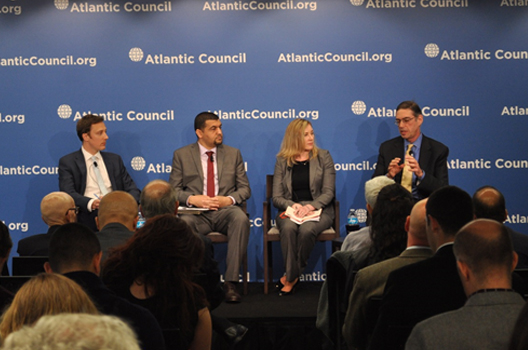 On November 2, 2016, the Atlantic Council’s Rafik Hariri Center for the Middle East hosted “ISIS the Day After Defeat,” a panel discussion featuring Resident Fellow at the Tahrir Institute for Middle East Policy Hassan Hassan, Director for Tradecraft and Innovation at the Institute for the Study of War Jessica Lewis McFate, and Senior Economist at the RAND Corporation Howard J. Shatz. The panel, moderated by Atlantic Council Senior Fellow Aaron Stein, discussed the current developments in the war against the Islamic State of Iraq and al-Sham (ISIS), particularly the Mosul operation that was currently in progress, and challenges they foresee emerging.
On November 2, 2016, the Atlantic Council’s Rafik Hariri Center for the Middle East hosted “ISIS the Day After Defeat,” a panel discussion featuring Resident Fellow at the Tahrir Institute for Middle East Policy Hassan Hassan, Director for Tradecraft and Innovation at the Institute for the Study of War Jessica Lewis McFate, and Senior Economist at the RAND Corporation Howard J. Shatz. The panel, moderated by Atlantic Council Senior Fellow Aaron Stein, discussed the current developments in the war against the Islamic State of Iraq and al-Sham (ISIS), particularly the Mosul operation that was currently in progress, and challenges they foresee emerging.
Stein opened the program by asking the panelists to comment on the progress of the Mosul offensive. Hassan emphasized the operation’s importance, citing that it is the first time the Iraqi state and Iraqi Kurds have been on the same side of a conflict in around 60 years. He added that the offensive seemed to be going well because the coalition is composed of the right forces. McFate agreed that the coalition is impressive and likely to outlast ISIS’s efforts, though ISIS is now trying to seek gains in cities such as Kirkuk and Sinjar in order to avert attention from Mosul. Shatz asserted the importance of Mosul in the context of the city’s history with Islamist organizations. ISIS’s predecessor—al-Qaeda in Iraq—used to conduct much of its fundraising efforts in Mosul and surrounding areas.
Stein then mentioned that although the battle for Mosul is relatively straightforward militarily, political problems are beginning to emerge. Hassan expanded on this point, asserting that politics have now become more significant than military challenges because there are many stakeholders involved in the operation and therefore multiple competing interests. Though the offensive seems to be progressing well at this time, Hassan argued, the situation on the ground may be quite different in a few months, when many of the coalition alliances begin to collapse. In a similar vein, McFate noted that the grievances of Sunnis in Iraq could, if left unaddressed, serve as spoilers for the Mosul operation.
Bringing Turkey into the conversation, Stein highlighted how the country’s ISIS problem emerged relatively late in comparison to Iraq and Syria. In his latest issue brief on ISIS networks in Turkey, he explains that ISIS cannot be thought of as only consisting of ground military forces because, in reality, they have tentacles of bureaucracy that extend across the region, including in Turkey.
Continuing the conversation on ISIS’s networks in various regions across the Middle East, Hassan added that the organization’s presence in Syria is much shallower than in Iraq, where they have planted strong roots. Therefore, the battle for Raqqa will be very different from the Mosul operation. Shatz added that, in attempting to defeat ISIS, it is always beneficial to take away their territory because the organization earns revenues by taxing and extorting the populations they control.
When asked for their recommendations to the next US administration regarding Iraq and Syria, Hassan argued that Syria is not yet ready for the demise of ISIS because destroying the Islamic State will leave behind a power vacuum that could be filled by any number of actors currently operating in the region. His recommendation to the next administration was to double down on preparing local forces to fill this void. McFate recommended the United States incorporate al-Qaeda into its anti-terror strategy in order to prevent the organization from taking advantage of sectarian and ethnic fault lines. Shatz added that the international community should remain invested in governance challenges in Iraq, including police training and developing better internal security infrastructure.
Image: From left: Aaron Stein, senior fellow with the Atlantic Council's Rafik Hariri Center for the Middle East, moderated a discussion with Hassan Hassan, a senior resident fellow at the Tahrir Institute for Middle East Policy; Jessica Lewis McFate, director of tradecraft and innovation at the Institute for the Study of War; and Howard J. Shatz, a senior economist at RAND Corporation. (Atlantic Council)
